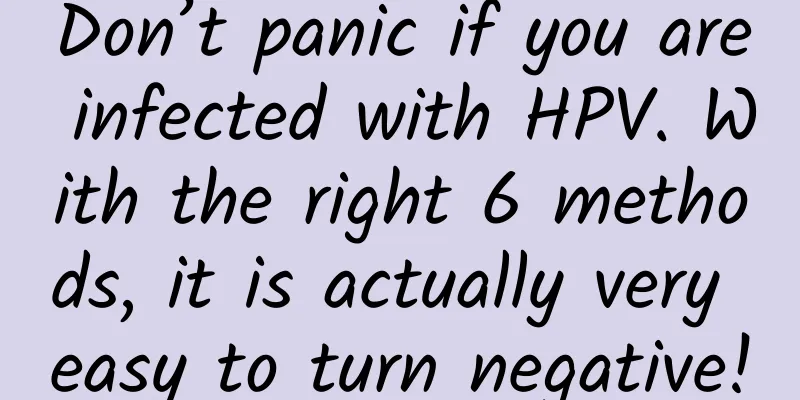Don’t panic if you are infected with HPV. With the right 6 methods, it is actually very easy to turn negative!

|
HPV infection is very common in today's society. We all know that HPV is closely related to cervical cancer, and many people are very nervous and afraid. In fact, HPV infection does not mean that you will definitely get cervical cancer. A doctor at Hunan Provincial Hospital of Traditional Chinese Medicine said that after people are infected with HPV, 90% of them are "transient infections" with no symptoms, and more than 80% of the infections can be cleared within 6-24 months by relying on the body's own immunity. HPV is divided into high-risk and low-risk types. Most people infected with high-risk and low-risk HPV do not have any symptoms or health problems that affect their normal life. If the infection is with high-risk HPV, it will take long-term persistent infection to develop into cervical lesions. The "long-term persistent infection" here means that every annual check-up shows a fixed positive HPV high-risk subtype for 5 to 10 years. Therefore, this is indeed a very long process. Even if HPV causes lesions, as long as the patient cooperates with the cervical biopsy and receives treatment based on the changes in cervical cells detected, cancer can be prevented. Do I need treatment after being infected with HPV? There are different responses or treatments for different situations of HPV infection. ● For simple HPV infection, no treatment is required. The key is to rely on the body's immune system to eliminate it. ● If only HPV is positive but cervical cytology is normal, follow-up observation can continue. ● If the test results are positive for HPV16 and HPV18, direct colposcopy is generally recommended. ● For HPV positivity and cervical cytology abnormalities exceeding a certain degree (ASC-US), further colposcopy should be considered to determine whether there are precancerous lesions. ● Genital warts caused by infections such as HPV6 and HPV11 fall into the category of sexually transmitted diseases and require treatment. ● Low-grade cervical intraepithelial lesions (LSIL) can be followed up and observed, while high-grade cervical intraepithelial lesions (HSIL) and adenocarcinoma in situ require treatment (except during pregnancy). Of course, everyone's situation is different, and the specific treatment plan needs to be formulated by the doctor based on the individual's situation. 1. Improve the body's immunity (1) Ensure adequate sleep. Adequate sleep can help maintain health and help restore and improve immune function. (2) Maintain a balanced diet. A balanced diet is essential for maintaining immune function and enhancing immunity. (3) Appropriate exercise is beneficial to blood circulation and metabolism, stimulates the activity of immune cells and thus enhances the body's immunity. 2. Eliminate fear, live a healthy life and improve physical fitness Many patients suffer from fear, anxiety, and excessive mental burden. This psychological dysfunction can disrupt the body's normal immune function, reduce the body's immune function and antiviral ability, facilitate virus reproduction, and often become the cause of relapse and difficulty in treatment. 3. Wear a condom during sex Condoms can partially prevent HPV reinfection. For HPV-positive women, if they do not want to get pregnant in the short term, it is recommended to wear condoms throughout sexual intercourse to reduce the chance of cross-infection. 4. Actively quit smoking and do not take contraceptive pills during treatment Long-term smoking and cervical HPV infection have a synergistic effect, increasing the risk of cervical cancer. Therefore, for women with persistent HPV infection, it is recommended to actively quit smoking. 5. Treatment of lower reproductive tract infections Recent studies have found that changes in vaginal microecology and lower reproductive tract infections are important factors for persistent high-risk HPV infection and cervical precancerous lesions. If the patient experiences abnormal vaginal discharge, odor, vulvar itching and other discomforts, he or she should go to the hospital in time to actively treat cervical or vaginal inflammation, create a good reproductive tract environment, and be more conducive to the body's "defeat" HPV. 6. HPV infection should be diagnosed and treated early Persistent HPV infection can be treated with topical application of HPV clearance and immune enhancers. (1) Topical medication Eliminate persistent HPV infection in the vagina, cervix, vulva and other parts of the reproductive tract to prevent pathogen colonization; effectively promote the repair of inflammatory or mechanical damage, form a barrier to protect the wound surface, so as to block the vicious cycle of repeated HPV infection in the reproductive tract and prevent cervical lesions. (2) Systemic medication You can take traditional Chinese medicine that has antiviral, heat-clearing, detoxifying and immunity-enhancing effects to activate the body's immune cells, improve the body's resistance, and help eliminate HPV viruses.
(Edited by YT) |
>>: A must-have for new parents! Learn these methods to deal with choking on milk!
Recommend
Can pregnant women drink Lanqin oral liquid?
The situation of pregnant women is very special. ...
Correct picture of lying on the left side at 30 degrees
Pregnant women need to pay attention to their sle...
International authoritative journal published: Ultra-large-scale comparison proves that the clinical efficacy of Azvudine is better than that of drug P
Recently, the top journal "Signal Transducti...
What is peach gum? What are the benefits of peach gum?
It is said that women are made of water, which me...
Is it easy to get pregnant if you have sex right after your period?
Most couples can stop having sex during a woman&#...
Why does a girl's right eyelid keep twitching?
When our eyelids are twitching. You will hear som...
Is it okay for a pregnant woman to pick her belly button?
After a woman becomes pregnant, her belly button ...
Which is better, dried durian or fresh durian? Where does dried durian come from?
Durian Dried is made by carefully selecting high-...
Women will benefit from rubbing this part for life
1Sanyinjiao acupoint is the huge wealth left to u...
Gynecological suppositories full name
Gynecological suppositories are medicines used in...
Why is there redness, swelling and pain in women's lower body?
The private part is one of the most important par...
Reasons for light menstrual flow after abortion
Nowadays, more and more women are having abortion...
Signs that a woman can't let go of her old love
Emotion is something that is hard to fathom. Some...
It's a big hit! Hundreds of thousands of people watch this video every day at the subway station here...
In the past two days, Fuzhou residents Have you n...
What are the dangers of men's wet wipes?
Men will encounter various obstacles when having ...









